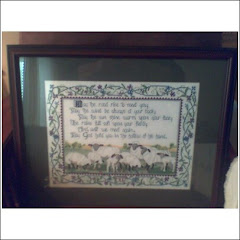Thy creating command was my beginning and foundation; for desiring to fashion me into a living being out of that which is invisible and that which is visible, Thou didst form my body out of earth, and didst give me a soul by Thy divine and life-creating breath.
-- from the Aposticha for Friday evening Vespers, in Tone 6
Had an e-mail from my son this morning that has sparked all kinds of contemplation, this final week before the start of Great Lent. Somehow, he has found out that he has Asperger's Syndrome, and wants to know why we never told him about in the 25 years he lived in our home. Good question.
Asperger's is classified as "high-end autism," and its chief characteristic seems to be that people with it can function beautifully in the world of books, of ideas, of creativity -- but not with other people. They can't pick up on "body language," and it causes them all kinds of grief. As I wrote to Chris, we never told him for the simple reason that it wasn't even recognized as a condition in this country until 1994, when he was halfway through high school; and even then, we ourselves didn't find out about until our son-in-law, who's a teacher, had a kid who was coded for Asperger's, and while researching the condition on the net, he came across the description. And our daughter recognized her brother right away. By that time, Chris was 21! And yeah, it sounds like him; but there was nothing we could do about it, at that point. There's also the matter that by adulthood, the condition is considered much less severe, mostly because a kid with Asperger's has been acting like an adult all his life, and as his peers catch up to his intellectual level, he just doesn't stand out as "odd" anymore.
I read my son's e-mail before starting my prayer rule -- one problem with the cold I have is that it interferes drastically with my sleep cycle, so I was up and wide awake at 3:00 a.m. -- and as I began my prayer rule, all I could think of was that God made this beautiful, beautiful soul -- and nobody appreciates how wonderful he is. (OK, not "nobody" -- his father and I do, of course, and thank heaven he has a girlfriend who knows how special he is!) But all his life, he's had to carry this cross that had no name, being made to feel as if something was "wrong" with him, that he was "flawed," or somehow "broken." And in this society, when something's broken -- we throw it away.
But how can you throw away a person? I don't know. But we do that too, in this society. If you don't fit the standard model, if you're in any way "weird" or "different" or "nerdy" -- you're a reject. That's what he's lived with. That's what we've lived with.
But not in Orthodoxy.
In Orthodoxy we have Fools for Christ, those people who give up even the appearance of sanity, like St. Xenia of St. Petersburg. At monasteries, there are monks and nuns who are a little "strange" in the head -- not that they represent any harm to anyone, but they just don't function like Everyone Else, maybe they obsess on music or they can't bear to be touched, or they have some other off-the-wall "defect." At the monastery where I go every summer, there's a man who has lived with the monks since he was 10, when he developed meningitis, which left him at the mental level of a 10-year-old. He's now in his 80s, and still living there, still an important part of the community. In Orthodoxy, it isn't just that there's room for a wider variety of people; it's the recognition that God made them as they are, and therefore what they are is good and right in His sight. That's the fundamental problem in this society, we've forgotten God -- so we've forgotten that He makes all kinds of people. Including people with Asperger's. Including people with more severe forms of autism. And He not only loves them, He cherishes them.
Recently I was reading in Guideposts about a woman with a "weird" son, a kid who isn't into sports or competition, but who loves animals, and who works at an animal shelter. One day he brought home a dog that no one could keep -- she was just "untrainable." Got into the laundry, chased people just for the fun of chasing them, rooted out anything they tried to hide, drove the family nuts. Somehow the kid introduced his dog to a cop, who said, "This dog would make a great police dog." They ended up taking her and training her to be a member of their K-9 unit, and, as the mother said, "Everything I thought was wrong with her, was what they were looking for in a great police dog." And I thought, there's a place for everybody in God's plan. Everything that's wrong in one situation, is exactly what's needed in another. There are no "rejects" in the sight of God.
My son, whom I love more than life itself, whose great beauty of soul has always been my inspiration... Help him bear his cross, O Lord, and lead him to that place where he is exactly what's needed. He has so much to offer, my beautiful child.
Saturday, March 05, 2005
Wednesday, March 02, 2005
There's something to be said for getting sick at, or near, the beginning of Lent.
Since Saturday I have had a cold, although on Saturday I didn't know it, and on Sunday I was just beginning to wonder about it. By Monday it was definite, and yesterday was the worst; and today, I'm still not fit for human society. Now, if you're going to get sick at all, the best way to get sick is with a cold, or even the flu. It's not serious enough to cause you to die by inches, in unimaginable suffering, but it's enough to cancel all your usual plans, lay you flat, and get you to do some thinking, even if the depth of your thought is nothing more metaphysical than, "God, why me?!"
The thing is, being sick reminds you of the one awareness Americans spend most of their lives running from: We are weak. It's almost unAmerican to be weak. Nobody likes weaklings in this country, and to be fair, America wouldn't be America if we hadn't had a sense of our innate strength. (I'm thinking of my great-grandmother on my father's side, one of those tough old Kansas pioneer women who was a child in the days of Wyatt Earp and Jesse James, and who died at the age of 105.) It took stamina to settle the West!
But the fact remains: We are weak. My grandmother on my father's side went deaf at age 10 from measles. My stepfather's sister died from measles, also at age 10. (Come to think of it, I was 10 when I had measles...) My grandmother on my mother's side died from complications in childbirth, leaving behind six children aged 11 to 6 weeks. Nobody wants these things to happen, but they do. Nobody wants to get sick, but we do. Why? Because there's only so much stamina we possess, and when we tap it out -- we get sick. And then what do we do? Stay in bed, drink hot fluids, growl at everybody, and grouse to ourselves that our lives have to be put on hold. And -- at least, I do this -- periodically I look up at my icons with bleary eyes and say, "This sucks."
In other words, I turn to God.
It's good to be reminded at the beginning of Lent that our own resources are limited at best, and probably more realistically an illusion. It's good to turn to God, even if only to say, "This sucks." And God, in His mercy -- allows us to have this experience without pulling the rug out from under our feet ("You have two months to live"). Just enough to remind us that we can make all the Five-Year Plans we want -- He's still in charge.
Point taken, Lord. Now, what else would You like me to learn from this upcoming Lent?
Since Saturday I have had a cold, although on Saturday I didn't know it, and on Sunday I was just beginning to wonder about it. By Monday it was definite, and yesterday was the worst; and today, I'm still not fit for human society. Now, if you're going to get sick at all, the best way to get sick is with a cold, or even the flu. It's not serious enough to cause you to die by inches, in unimaginable suffering, but it's enough to cancel all your usual plans, lay you flat, and get you to do some thinking, even if the depth of your thought is nothing more metaphysical than, "God, why me?!"
The thing is, being sick reminds you of the one awareness Americans spend most of their lives running from: We are weak. It's almost unAmerican to be weak. Nobody likes weaklings in this country, and to be fair, America wouldn't be America if we hadn't had a sense of our innate strength. (I'm thinking of my great-grandmother on my father's side, one of those tough old Kansas pioneer women who was a child in the days of Wyatt Earp and Jesse James, and who died at the age of 105.) It took stamina to settle the West!
But the fact remains: We are weak. My grandmother on my father's side went deaf at age 10 from measles. My stepfather's sister died from measles, also at age 10. (Come to think of it, I was 10 when I had measles...) My grandmother on my mother's side died from complications in childbirth, leaving behind six children aged 11 to 6 weeks. Nobody wants these things to happen, but they do. Nobody wants to get sick, but we do. Why? Because there's only so much stamina we possess, and when we tap it out -- we get sick. And then what do we do? Stay in bed, drink hot fluids, growl at everybody, and grouse to ourselves that our lives have to be put on hold. And -- at least, I do this -- periodically I look up at my icons with bleary eyes and say, "This sucks."
In other words, I turn to God.
It's good to be reminded at the beginning of Lent that our own resources are limited at best, and probably more realistically an illusion. It's good to turn to God, even if only to say, "This sucks." And God, in His mercy -- allows us to have this experience without pulling the rug out from under our feet ("You have two months to live"). Just enough to remind us that we can make all the Five-Year Plans we want -- He's still in charge.
Point taken, Lord. Now, what else would You like me to learn from this upcoming Lent?
Subscribe to:
Comments (Atom)




